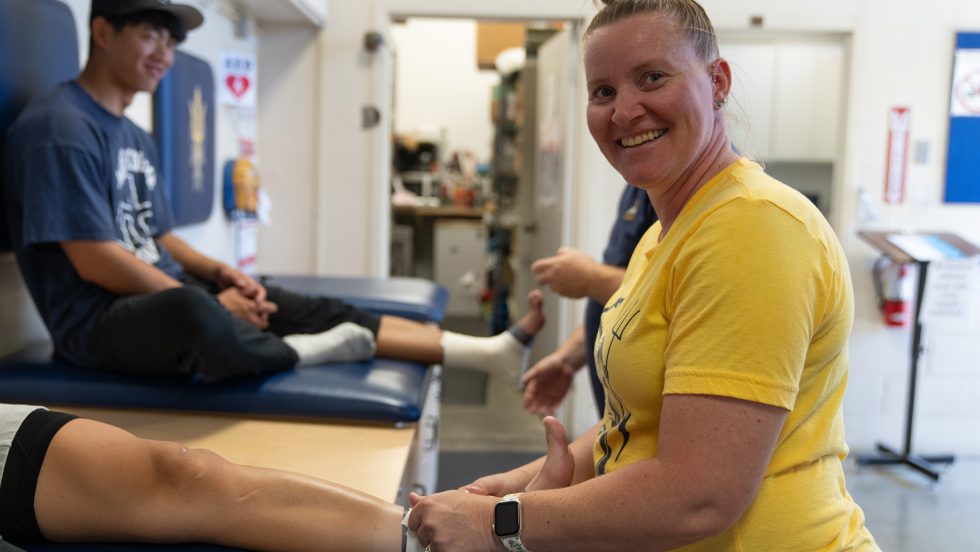Sophomore Miku Chikakane traveled more than 5,000 miles across the Pacific Ocean and the international date line to study kinesiology at Merced College.
She chose to leave Tokyo, one of the most vibrant, cosmopolitan areas of the world, for Merced, a small, charming town in central California, and the chance to further study kinesiology and get better at her craft as an athletic trainer.
“Athletic training in the U.S. is the highest level anywhere,” Chikakane said. “I came because I want to be a certified athletic trainer in the United States.”
Blue Devils head volleyball coach Jessica Casey, who also teaches kinesiology, knows why the draw is so strong for this training.
“Kinesiology is such a hot major right now,” she said. “We’re getting all sorts of students here interested in a wide variety of disciplines within the sports sciences. Kinesiology is a big umbrella that covers so many jobs that are high paying and high demand, and so important when we consider the overall health of people in the United States.”
According to the U.S. Bureau of Labor Statistics, athletic trainer jobs are expected to grow by a healthy 14 percent over the next decade.
Chikakane had earned enough experience after two years as a sports and health major at Hosei University in Tokyo to work as an athletic trainer in Japan. She came to the U.S. to perfect her English, and to earn U.S. certification as an athletic trainer.
But she didn’t just throw a dart at a map to find Merced. Since 1998, roughly 1,000 Japanese nationals have matriculated to Merced College.
International Student Support Coordinator Mayumi Wood said the numbers vary, but she estimates at least five Japanese students come to Merced College specifically to study and work in the athletic training facility each year.
“Our kinesiology program is the building block that exposes our students to a variety of career pathways,” said Professor Scott McCall, who also coaches men’s water polo and swimming. “We have so many strong faculty that have not just a strong background in kinesiology, but a breadth of experience in the field it encompasses.”
McCall teaches Kinesiology 1, which introduces students to an interdisciplinary approach to the study of human movement. In the class, McCall reviews the sub-disciplines of kinesiology and the wide variety of career opportunities you can pursue with that degree, from coaching and fitness training to sports rehabilitation and physical therapy, and beyond.
There are specific pathways at Merced College under the kinesiology umbrella. For example, the Physical Education associate degree is a great start towards becoming a P.E. teacher or coach. There’s a two-year personal training pathway for those who want to train people in gyms.
Students who receive the Kinesiology AA-T degree want to work with patients. If they secure the Athletic Training certificate, they’re also set to work every day with Blue Devil athletes in the college’s Athletic Training Facility.
“We have fantastic students,” said Scott Lemberger, a health instructor who is one of two full-time athletic trainers at the college. “Whether they’re here for a short time or a long time, they’re all eventually successful.”
Chikakane could have found similar offerings at other universities in Japan. But she would have had to wait to work with athletes.
“I like all of the jobs in athletic training,” she said after returning from a recent football practice. “But communicating with athletes is the best job I get to do.”
There are four semesters’ worth of skills relating to taping body parts, learning rehab techniques, etc., that student trainers like Chikakane learn at the facility. Under the supervision of Lemberger and Sierra Williams, the Blue Devils’ other certified athletic trainer, students help athletes rehab from injuries, including testing their progress, and also study hydration practices.
“This is a chance for students to actually interact with our athletes to prevent and rehab injuries with actual hands-on experiences,” Lemberger said. “If they had gone directly to a university, they may not have a chance to touch an athlete until they were juniors or seniors.”
Chikakane is hoping to earn her AA-T in Kinesiology after just three semesters and transfer to Fresno State in the spring. She will pursue her bachelor’s and master’s degrees, and eventually a Doctor of Physical Therapy or medical degree.
“There are so many athletes and so many teams here—so many universities, and professional and amateur sports,” she said. “I probably won’t go back to Japan. There are so many jobs here. The sports market is so much bigger than in Japan.”
